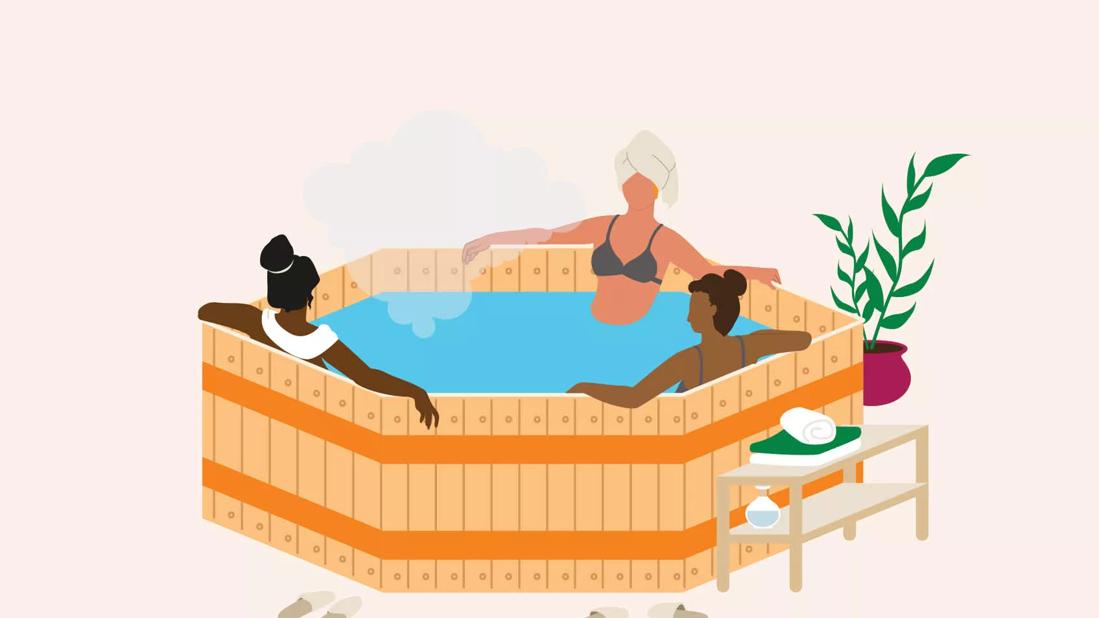A hot soak can relieve pain, improve sleep and more

Image content: This image is available to view online.
View image online (https://assets.clevelandclinic.org/transform/9d1f5c7c-625f-4c5b-a185-fe43e147a13d/Hot-Tub-1312263960-770x533-1_jpg)
3 people in a hot tub.
There’s something about soaking in a hot tub that just feels oh so good. But do hot tubs have any health benefits beyond relaxation? Integrative medicine physician Irina Todorov, MD, shares what science says about hot tubbing and your health.
Advertisement
Cleveland Clinic is a non-profit academic medical center. Advertising on our site helps support our mission. We do not endorse non-Cleveland Clinic products or services. Policy
For many people, hot tubs boost physical and mental health by doing the following:
Ironically, hot water can help you chill. Some studies have shown that immersing yourself in hot water could relieve stress and decrease depression symptoms.
“Using a hot tub or taking a hot bath helps calm your nervous system and improve your mood,” says Dr. Todorov. “Research shows that people who take hot baths instead of showers report lower levels of stress.”
Hot tubbing probably isn’t going to cure mental health problems. But a hot soak gives you some time to relax and unwind, so go ahead and enjoy it without guilt.
A quick dip in the tub may be just what you need for muscle pain. A hot tub makes sore, tired muscles feel better because:
“Achy muscles or a tense back often feel better after using a hot tub,” says Dr. Todorov. “Hot water is a good alternative to over-the-counter pain relievers for mild to moderate muscle pain.”
Don’t stay in the hot water for more than 15 minutes, though. Using a hot tub for too long could send too much blood flow to your muscles, which can lead to swelling.
Advertisement
If you regularly hot tub or take hot baths, your heart may thank you. One study found that people who took more frequent hot baths were less likely to develop cardiovascular disease.
“A hot tub doesn’t replace the need for a heart-healthy diet and regular exercise,” notes Dr. Todorov. “But using a hot tub in addition to those measures could be beneficial for your heart health.”
But talk to your provider before hot tubbing if you have any health conditions.
“Heating up in a hot tub makes your heart beat faster,” she adds. “The heat can stress your heart and may be dangerous for people with heart disease.”
“Soaking in hot water widens your blood vessels, which lowers your blood pressure,” explains Dr. Todorov. “Lower blood pressure can help you relax, but the effects are only temporary. Your blood pressure returns to normal a few minutes after you get out of the tub.”
But if you already have low blood pressure (hypotension), the hot water could be too much.
“People who already have low blood pressure should avoid soaks that are much hotter than body temperature,” cautions Dr. Todorov. “Their blood pressure could drop to dangerously low levels.”
But if you have high blood pressure (hypertension), hot tubs are likely safe and could be beneficial.
“Most people with mild hypertension can safely use a hot tub,” she notes. “But hot tubbing cannot take the place of your medical treatment or blood pressure medications.”
If you have trouble nodding off at night, a hot tub could help. The muscle-relaxing, mood-boosting effects of hot water can help you soak the day away and prepare you for sleep. You also experience a change in your body temperature that tells your body it’s time for dreamland.
Your body temperature changes throughout the day and naturally dips when you approach bedtime. So, heating up in a hot tub — and then cooling off — encourages the drop in temperature that happens before you fall asleep.
“This increase in temperature, and subsequent drop after you get out, could encourage better quality sleep,” says Dr. Todorov.
But don’t wait until bedtime to slip into the tub.
“Give your body time to cool back down, or you won’t feel tired,” she adds. “Get out of the tub about 90 minutes before you plan to go to bed.”
Many people reap the benefits of regular hot tubbing and can safely do it every day if they choose. But don’t use a hot tub or take hot baths if you’re pregnant. A higher body temperature can harm a developing fetus, especially in the first trimester. You should also avoid hot tubs if you have:
Advertisement
Some hot tubs are breeding grounds for germs. Only use hot tubs that you know are regularly cleaned and well-maintained with the proper levels of chemicals. A hot tubbing ritual can be safe and healthy if you:
If you’re in good health, go ahead and enjoy a hot soak. But keep in mind that the health benefits are a bonus, not a replacement for medical care.
“A hot tub isn’t going to solve any health problems, but it can feel great,” says Dr. Todorov. “And if you start to feel unwell or you just don’t like the heat, it’s a sign you should get out.”
Advertisement

Delivered every Tuesday!
Sign up for our Health Essentials emails for expert guidance on nutrition, fitness, sleep, skin care and more
Learn more about our editorial process.
Advertisement
Bleeding is a risk and warrants taking care, but the reward of this lifesaving medication is great
Severe and debilitating headaches can affect the quality of your child’s life
With repeat injections over time, you may be able to slow the development of new wrinkles
Although it can be alarming, it’s normal to experience blood clots during menstruation
Stretch before heading outside, keep proper form and avoid jerking or twisting to throw snow
Type 2 diabetes isn’t inevitable with these dietary changes
Applying a hot or cold compress can help with pain
Pump up your iron intake with foods like tuna, tofu and turkey